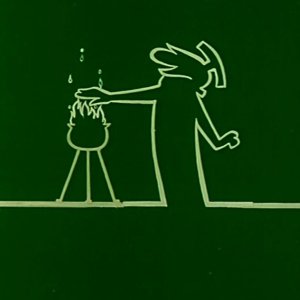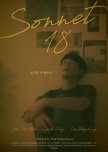Masks, metaphors and speaking through the words of another
"Sonnet 18" is a short film that, typical of its genre, hints at underlying themes, characterisations and even the plot itself, rather than telling us everything.
With this genre, I find that either you either relate to the characters or you don't -- since there's not much time to tell the story, the viewer must make their connection quickly and easily, or they will feel like I did with this one -- able to appreciate the beauty of the storytelling but not really liking it.
Was it good?
Absolutely. It's an artistic short film that tells its story with a specific aesthetic, and it's very consistent with that.
Did I like it?
Somewhat. I can appreciate the story they wanted to tell and the artistic way they told it. But I wasn't emotionally invested enough (that's me, not the film's fault).
Would I recommend it?
I wouldn't *not* recommend it, since it's so short; and it is well-done. People who like their plots spelled out for them might not find it engaging.
I liked that almost everything was filled with meaning: Where the characters are and what they are doing there (and in what state of mind), how they speak or don't speak, and at what times each one wears a (metaphorical or real) mask. The romantic classics (Debussy, Chopin, Brahms) are used sparingly, and with clear intention -- mostly we hear no background music, and the starkness of the silence underlines the characters' emotional state.
As for the use of Sonnet 18 -- we hear it three times. The first time we hear it is when the actor recites it on stage. To be honest, I did not like that one at first -- it felt almost farcical, with the overly theatrical hand gestures and intonation. The second recitation, however, made it clear that this was very deliberate -- and the third recitation confirmed it. If you watch the film, I urge you to pay some attention to how the sonnet is spoken each time.
Dialogue was used very sparingly -- and I wished they had used even less. The long stretches of silence felt more powerful to me than any of the dialogue (except for the recitations of the sonnet); and I think some of the dialogue could have been shortened even more.
Let the sonnet and the way both characters recite it and the silence in between, do the talking. Just as no single word in a sonnet is meaningless, so the dialogue in this short film could have been.
Overall, this is a well-crafted short film, obviously made with dedication and love.
With this genre, I find that either you either relate to the characters or you don't -- since there's not much time to tell the story, the viewer must make their connection quickly and easily, or they will feel like I did with this one -- able to appreciate the beauty of the storytelling but not really liking it.
Was it good?
Absolutely. It's an artistic short film that tells its story with a specific aesthetic, and it's very consistent with that.
Did I like it?
Somewhat. I can appreciate the story they wanted to tell and the artistic way they told it. But I wasn't emotionally invested enough (that's me, not the film's fault).
Would I recommend it?
I wouldn't *not* recommend it, since it's so short; and it is well-done. People who like their plots spelled out for them might not find it engaging.
I liked that almost everything was filled with meaning: Where the characters are and what they are doing there (and in what state of mind), how they speak or don't speak, and at what times each one wears a (metaphorical or real) mask. The romantic classics (Debussy, Chopin, Brahms) are used sparingly, and with clear intention -- mostly we hear no background music, and the starkness of the silence underlines the characters' emotional state.
As for the use of Sonnet 18 -- we hear it three times. The first time we hear it is when the actor recites it on stage. To be honest, I did not like that one at first -- it felt almost farcical, with the overly theatrical hand gestures and intonation. The second recitation, however, made it clear that this was very deliberate -- and the third recitation confirmed it. If you watch the film, I urge you to pay some attention to how the sonnet is spoken each time.
Dialogue was used very sparingly -- and I wished they had used even less. The long stretches of silence felt more powerful to me than any of the dialogue (except for the recitations of the sonnet); and I think some of the dialogue could have been shortened even more.
Let the sonnet and the way both characters recite it and the silence in between, do the talking. Just as no single word in a sonnet is meaningless, so the dialogue in this short film could have been.
Overall, this is a well-crafted short film, obviously made with dedication and love.
Was this review helpful to you?


 4
4














